The LIFE PASTORALP team has established networking activities with the following projects so far:
LIFE FO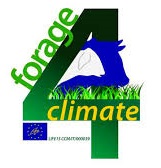 RAGE4CLIMATE (LIFE15 CCM/IT/000039) Forage systems for less GHG emission and more soil carbon sink in continental and Mediterranean agricultural areas. The overall aim of the project is demonstrating how agricultural systems linked to milk production can be active in mitigating climate change through (i) the application of good practices (BP) contributing to reduce emissions and to preserve and/or increase the carbon stocks (arable land, meadows and pastures) used to produce fodder for feeding ruminants (cattle, sheep and goats); (ii) the development and dissemination of tools for the assessment of carbon stocks and greenhouse gas emissions (GHG) meeting IPCC(2006) requirements and to assess the effects of mitigation measures. Two people from UNIFI team are members of the FORAGE4CLIMATE Steering Committee.
RAGE4CLIMATE (LIFE15 CCM/IT/000039) Forage systems for less GHG emission and more soil carbon sink in continental and Mediterranean agricultural areas. The overall aim of the project is demonstrating how agricultural systems linked to milk production can be active in mitigating climate change through (i) the application of good practices (BP) contributing to reduce emissions and to preserve and/or increase the carbon stocks (arable land, meadows and pastures) used to produce fodder for feeding ruminants (cattle, sheep and goats); (ii) the development and dissemination of tools for the assessment of carbon stocks and greenhouse gas emissions (GHG) meeting IPCC(2006) requirements and to assess the effects of mitigation measures. Two people from UNIFI team are members of the FORAGE4CLIMATE Steering Committee.
 LIFE OREKAMENDIAN (LIFE15 NAT/ES/000805) Preservation of pastureland habitats in Basque mountains is a LIFE project with the overall aim to (i) develop a shared strategy to manage mountain pasture areas in 15 Natura 2000 sites of the Spanish Basque country and the 8 Special Preservation Zones of the French Basque Country; (ii) To seek balance between preservation interests and the interests of mountain users. Most of the project partners work with local stakeholders on the ground to elaborate those strategies. October the 9th 2019 we met partners from LIFE OREKIA MENDIAN in order to establish some joint activities and synergies between the two projects. We also visited on demonstration farm of LIFE PASTORALP.
LIFE OREKAMENDIAN (LIFE15 NAT/ES/000805) Preservation of pastureland habitats in Basque mountains is a LIFE project with the overall aim to (i) develop a shared strategy to manage mountain pasture areas in 15 Natura 2000 sites of the Spanish Basque country and the 8 Special Preservation Zones of the French Basque Country; (ii) To seek balance between preservation interests and the interests of mountain users. Most of the project partners work with local stakeholders on the ground to elaborate those strategies. October the 9th 2019 we met partners from LIFE OREKIA MENDIAN in order to establish some joint activities and synergies between the two projects. We also visited on demonstration farm of LIFE PASTORALP.
 LIFE ADAPTAMED (LIFE14 CCA/ES/000612) The project aims to (i) mitigate the negative effect of Climate Change on key ecosystem services in areas which are three iconic and representative Mediterranean Natural Protected Areas (Nature & National Park and Biosphere Reserve); (ii) provide to local inhabitants and their socioeconomic sector. The project focuses on developing, implementing, monitoring, evaluating and disseminating adaptative management measures, with an ecosystemic approach, addressed to those socio-ecosystems identified as key for the provision of, among others, soil retention, polinization, pastures (net primary production), temperature regulation, water provision, prevention of forest fires and of desertification. The three areas are: (1) a Mediterranean wetland, Doñana Nature Space; (2) a Mediterranean high mountain range, Sierra Nevada Nature Space; (3) a subdesertic Mediterranean coastal area, Cabo de Gata Nature Park. Some knowledge and activities sharing have been already established with the coordinating beneficiary.
LIFE ADAPTAMED (LIFE14 CCA/ES/000612) The project aims to (i) mitigate the negative effect of Climate Change on key ecosystem services in areas which are three iconic and representative Mediterranean Natural Protected Areas (Nature & National Park and Biosphere Reserve); (ii) provide to local inhabitants and their socioeconomic sector. The project focuses on developing, implementing, monitoring, evaluating and disseminating adaptative management measures, with an ecosystemic approach, addressed to those socio-ecosystems identified as key for the provision of, among others, soil retention, polinization, pastures (net primary production), temperature regulation, water provision, prevention of forest fires and of desertification. The three areas are: (1) a Mediterranean wetland, Doñana Nature Space; (2) a Mediterranean high mountain range, Sierra Nevada Nature Space; (3) a subdesertic Mediterranean coastal area, Cabo de Gata Nature Park. Some knowledge and activities sharing have been already established with the coordinating beneficiary.
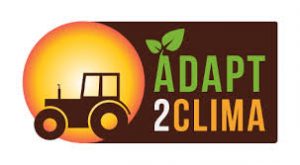 LIFE ADAPT2CLIMA (LIFE14 CCA/GR/00092) Adaptation to Climate change Impacts on the Mediterranean islands’ Agriculture. The project aims to increase knowledge on the vulnerability of EU Mediterranean agriculture to climate change and to support decision making for adaptation planning. The methodology is based on the deployment of a set of climate, hydrological and crop simulation models for the assessment of climate change impacts on agriculture, as well as, on the development of a decision support tool for the elaboration of adaptation strategies for the agricultural sector. The project implementation area comprises of three of the largest islands of the Mediterranean Europe, the islands of Crete (Greece), Sicily (Italy) and Cyprus. UNIFI collaborates with LIFE ADAPT2CLIMA project, networking activities will comprise the deplyoment of the PASTORALP platform tools.
LIFE ADAPT2CLIMA (LIFE14 CCA/GR/00092) Adaptation to Climate change Impacts on the Mediterranean islands’ Agriculture. The project aims to increase knowledge on the vulnerability of EU Mediterranean agriculture to climate change and to support decision making for adaptation planning. The methodology is based on the deployment of a set of climate, hydrological and crop simulation models for the assessment of climate change impacts on agriculture, as well as, on the development of a decision support tool for the elaboration of adaptation strategies for the agricultural sector. The project implementation area comprises of three of the largest islands of the Mediterranean Europe, the islands of Crete (Greece), Sicily (Italy) and Cyprus. UNIFI collaborates with LIFE ADAPT2CLIMA project, networking activities will comprise the deplyoment of the PASTORALP platform tools.
 EUROMONTANA is the European multisectoral association for co-operation and development of mountain territories. It embraces regional and national mountain organisations throughout greater Europe, including regional development agencies, local authorities, agriculture organisations, environmental agencies, forestry organisations and research institutes. Euromontana’s mission is to promote living mountains, integrated and sustainable development and quality of life in mountain areas. In order to achieve this, Euromontana facilitates the exchange of information and experience among these areas by organising seminars and major conferences, by conducting and collaborating in studies, by developing, managing and participating in European projects and by working with the European institutions on mountain issues. UNIFI had some skype meetings with persons from EUROMONTANA which is giving support to PASTORALP dissemination and for spreading questionnaires amongst stakeholders.
EUROMONTANA is the European multisectoral association for co-operation and development of mountain territories. It embraces regional and national mountain organisations throughout greater Europe, including regional development agencies, local authorities, agriculture organisations, environmental agencies, forestry organisations and research institutes. Euromontana’s mission is to promote living mountains, integrated and sustainable development and quality of life in mountain areas. In order to achieve this, Euromontana facilitates the exchange of information and experience among these areas by organising seminars and major conferences, by conducting and collaborating in studies, by developing, managing and participating in European projects and by working with the European institutions on mountain issues. UNIFI had some skype meetings with persons from EUROMONTANA which is giving support to PASTORALP dissemination and for spreading questionnaires amongst stakeholders.
 LIFE XEROGRAZING (LIFE12 NAT/IT/000818) The purpose of the LIFE Xero-grazing project (Semi-natural dry-grassland conservation and restoration in Valle Susa through grazing management) is the conservation and the restoration of priority habitat 6210*, seminatural dry grasslands and scrubland facies on calcareous substrates (Festuco-Brometalia) (important orchid sites), within a representative pastoral area of the SCI IT1110030 “Oasi xerotermiche della Valle di Susa – Orrido di Chianocco e Foresto”. Today, it is affected by changes in the floristic composition and progressive invasion of trees and shrubs due to the absence of its use, for decades. The project aims to technically define and implement actions for the conservation and restoration of significant portions of the habitat. As a result, the project will be able to produce technical notes that the Alpi Cozie Natural Park (and other SCI areas) could apply to ensure a sustainable and long-term management of the habitat. In particular, the project aims: i) To restore shrub and tree-encroached areas through actions of mechanical clearing and cutting. Even though the transition facies are included in the 6210 habitat, they can represent a threat for orchids; ii) To define technical notes for a rational and conservative grazing management of the habitat and to apply them in particular areas (e.g. by buying domestic animals and arranging grazing structures); iii) To develop the touristic and participative values of the area, increasing the awareness on the use of natural resources. Through agro-pastoral character interventions, the project aims to restore about 20 hectares of 6210* habitat currently encroached by shrubs and trees as well as applying a conservative management to approximately 83 hectares of dry grassland. Some partners of LIFE XEROGRAZING projects are members of PASTORALP Steering Committee. Networking actions regard synergies within dissemination and communication and stakeholder engagement. May the 30th we presented the preliminary results of PASTORALP during the final conference of XEROGRAZING
LIFE XEROGRAZING (LIFE12 NAT/IT/000818) The purpose of the LIFE Xero-grazing project (Semi-natural dry-grassland conservation and restoration in Valle Susa through grazing management) is the conservation and the restoration of priority habitat 6210*, seminatural dry grasslands and scrubland facies on calcareous substrates (Festuco-Brometalia) (important orchid sites), within a representative pastoral area of the SCI IT1110030 “Oasi xerotermiche della Valle di Susa – Orrido di Chianocco e Foresto”. Today, it is affected by changes in the floristic composition and progressive invasion of trees and shrubs due to the absence of its use, for decades. The project aims to technically define and implement actions for the conservation and restoration of significant portions of the habitat. As a result, the project will be able to produce technical notes that the Alpi Cozie Natural Park (and other SCI areas) could apply to ensure a sustainable and long-term management of the habitat. In particular, the project aims: i) To restore shrub and tree-encroached areas through actions of mechanical clearing and cutting. Even though the transition facies are included in the 6210 habitat, they can represent a threat for orchids; ii) To define technical notes for a rational and conservative grazing management of the habitat and to apply them in particular areas (e.g. by buying domestic animals and arranging grazing structures); iii) To develop the touristic and participative values of the area, increasing the awareness on the use of natural resources. Through agro-pastoral character interventions, the project aims to restore about 20 hectares of 6210* habitat currently encroached by shrubs and trees as well as applying a conservative management to approximately 83 hectares of dry grassland. Some partners of LIFE XEROGRAZING projects are members of PASTORALP Steering Committee. Networking actions regard synergies within dissemination and communication and stakeholder engagement. May the 30th we presented the preliminary results of PASTORALP during the final conference of XEROGRAZING
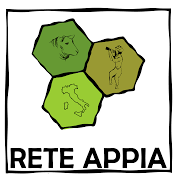 RETE APPIA Rete Italiana della Pastorizia ONLUS. The Association is pluralistic and non-profit-oriented, and aims to protect extensive pastoralism still practiced in continuity with herd movements (including transhumance, montage / demontication, wandering pasture). The Association also protects the individual and collective rights of the livestock breeders in the wild and semi-wild (henceforth referred to as “shepherds”), their profession, cultural practices and typical productions of the sector. The mission of the Network is to contribute to the improvement of interactions and collaborations between pastoralists in Italy on issues and problems of common interest and on the economic activities of the sector. UNIFI has established contacts with representative of Rete Appia so as to promote interactions between PASTORALP and the network of Italian shepherds, as well as the possibility of presenting project proposals together.
RETE APPIA Rete Italiana della Pastorizia ONLUS. The Association is pluralistic and non-profit-oriented, and aims to protect extensive pastoralism still practiced in continuity with herd movements (including transhumance, montage / demontication, wandering pasture). The Association also protects the individual and collective rights of the livestock breeders in the wild and semi-wild (henceforth referred to as “shepherds”), their profession, cultural practices and typical productions of the sector. The mission of the Network is to contribute to the improvement of interactions and collaborations between pastoralists in Italy on issues and problems of common interest and on the economic activities of the sector. UNIFI has established contacts with representative of Rete Appia so as to promote interactions between PASTORALP and the network of Italian shepherds, as well as the possibility of presenting project proposals together.
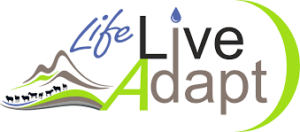 LIFE LIVEADAPT (LIFE17 CCA/ES/000035) The project, comprising international research of Spain, Portugal and France aims at identify adaptation to climate change in livestock production of southern Europe. In the specific LIVEADAPT will implement strategies based on technologies and innovative practices that will allow the adaptation of the livestock sector to climate change. Innovations in the improvement of the collection and the use of water or use of ICT for the management of livestock is emerging as the lines of action to follow in this regard. UNIFI has established contacts with the coordinating beneficiary so as to promote interactions between the two projects but also the possibility of presenting project proposals together.
LIFE LIVEADAPT (LIFE17 CCA/ES/000035) The project, comprising international research of Spain, Portugal and France aims at identify adaptation to climate change in livestock production of southern Europe. In the specific LIVEADAPT will implement strategies based on technologies and innovative practices that will allow the adaptation of the livestock sector to climate change. Innovations in the improvement of the collection and the use of water or use of ICT for the management of livestock is emerging as the lines of action to follow in this regard. UNIFI has established contacts with the coordinating beneficiary so as to promote interactions between the two projects but also the possibility of presenting project proposals together.
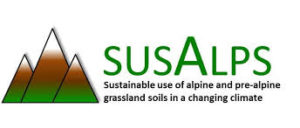 The SUSALPS German project (financed by the Federal Ministry of Education and Research) aims at improving the knowledge on the effects of current and future climate and management on ecosystem functions performed by grasslands. In the process, the general framework of the socio-economy of the specific geographic region will be considered. Based on this improved knowledge, sustainable management options for grasslands in the alps and the foothills of the alps will be developed. These management options will be especially designed to support the climate protection function of grassland soils. UNIFI has established contacts with the coordinating beneficiary and a networking visit has been planned.
The SUSALPS German project (financed by the Federal Ministry of Education and Research) aims at improving the knowledge on the effects of current and future climate and management on ecosystem functions performed by grasslands. In the process, the general framework of the socio-economy of the specific geographic region will be considered. Based on this improved knowledge, sustainable management options for grasslands in the alps and the foothills of the alps will be developed. These management options will be especially designed to support the climate protection function of grassland soils. UNIFI has established contacts with the coordinating beneficiary and a networking visit has been planned.
PASTUCAR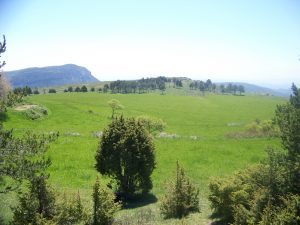 is a dissemination project aimed at transferring and unify the knowledge derived from the work of experts, farmers and managers of the agro-livestock sector on good management practices that promote the preservation and accumulation of carbon in pastures, as well as soil fertility, biodiversity conservation and mitigation of greenhouse gas emissions, encouraging more productive and sustainable pastoral systems within the framework of the regional government of Catalonia. On the 20th of November 2020 we met remotely with the coordinating partner of the PASTUCAR project (Forest Science and Technology Centre of Catalonia (CTFC), Solsona, Lleida). Since the topics analyzed by the two projects are very similar an exchange of knowledge will help in establishing some joint activities and synergies between the two projects, allowing to extend PASTORALP results and findings in different areas.
is a dissemination project aimed at transferring and unify the knowledge derived from the work of experts, farmers and managers of the agro-livestock sector on good management practices that promote the preservation and accumulation of carbon in pastures, as well as soil fertility, biodiversity conservation and mitigation of greenhouse gas emissions, encouraging more productive and sustainable pastoral systems within the framework of the regional government of Catalonia. On the 20th of November 2020 we met remotely with the coordinating partner of the PASTUCAR project (Forest Science and Technology Centre of Catalonia (CTFC), Solsona, Lleida). Since the topics analyzed by the two projects are very similar an exchange of knowledge will help in establishing some joint activities and synergies between the two projects, allowing to extend PASTORALP results and findings in different areas.
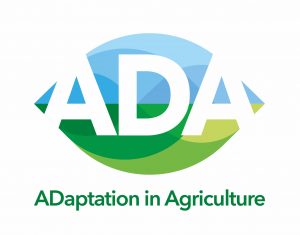 Life ADA – Adaptation in Agriculture – (LIFE19 CCA / IT / 001257) aims to increase the capacity of farmers and producer organizations (in wine, fruit and vegetable and dairy sectors) to implement adaptation strategies to climate change. To achieve this goal, a public-private partnership has been set up between insurance, public administration (regions), scientific institutes and aggregated forms of producers. This group aims to transfer knowledge on climate scenarios and risk management, as well as measures for adaptation to climate change; to build adequate tools to support the decision-making process and in the definition of adaptation plans at farm and supply chain level; to define a regional policy strategy to support farmers’ adaptation plans; to promote an innovative approach in order to maintain the long-term insurability of farmers despite the increase in catastrophic and systemic risks. UNIFI has established contacts with the coordinating beneficiary.
Life ADA – Adaptation in Agriculture – (LIFE19 CCA / IT / 001257) aims to increase the capacity of farmers and producer organizations (in wine, fruit and vegetable and dairy sectors) to implement adaptation strategies to climate change. To achieve this goal, a public-private partnership has been set up between insurance, public administration (regions), scientific institutes and aggregated forms of producers. This group aims to transfer knowledge on climate scenarios and risk management, as well as measures for adaptation to climate change; to build adequate tools to support the decision-making process and in the definition of adaptation plans at farm and supply chain level; to define a regional policy strategy to support farmers’ adaptation plans; to promote an innovative approach in order to maintain the long-term insurability of farmers despite the increase in catastrophic and systemic risks. UNIFI has established contacts with the coordinating beneficiary.
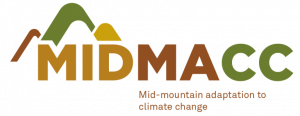 LIFE MIDMACC (LIFE18 CCA/ES/001099) The project promotes adaptation through the implementation and testing of different landscape management measures to meet climate change related challenges in marginal mid-mountain areas of Spain (La Rioja, Aragón and Catalonia), while improving their socioeconomic development. We implement three pilots experiences in mid-mountain areas: (i) pasture recovery through scrubland clearing and introduction of extensive livestock farming; (ii) forest management for fire risk prevention and maintenance with extensive livestock farming; and (iii) introduction and/or optimisation of vineyards in mountain areas. Main project activities include: 1) develop landscape adaptation measures in marginal mid-mountain areas in order to improve their environmental and socioeconomic resilience to climate change: 2) assess the socio-economic and ecological effectiveness of the applied measures through widespread monitoring and modelling; 3) involve the regional managers and stakeholders in the design, development and evaluation of adaptation measures, through decision-making regional committees; 4) engage the governments of La Rioja, Aragon and Catalonia in the creation of a coordinated policy framework that improves the sustainable use of mid-mountain areas; 5) develop an integrated climate change Adaptation Guidelines for mid-mountain areas; 6) carry out awareness and capacity building activities on adaptation to climate change at local and regional level; and 7) support the application and further development of European policies related to climate change adaptation in mountainous rural areas. Networking activities have been outlined and visits to the pilot experiences along 2021-2022 are been programmed.
LIFE MIDMACC (LIFE18 CCA/ES/001099) The project promotes adaptation through the implementation and testing of different landscape management measures to meet climate change related challenges in marginal mid-mountain areas of Spain (La Rioja, Aragón and Catalonia), while improving their socioeconomic development. We implement three pilots experiences in mid-mountain areas: (i) pasture recovery through scrubland clearing and introduction of extensive livestock farming; (ii) forest management for fire risk prevention and maintenance with extensive livestock farming; and (iii) introduction and/or optimisation of vineyards in mountain areas. Main project activities include: 1) develop landscape adaptation measures in marginal mid-mountain areas in order to improve their environmental and socioeconomic resilience to climate change: 2) assess the socio-economic and ecological effectiveness of the applied measures through widespread monitoring and modelling; 3) involve the regional managers and stakeholders in the design, development and evaluation of adaptation measures, through decision-making regional committees; 4) engage the governments of La Rioja, Aragon and Catalonia in the creation of a coordinated policy framework that improves the sustainable use of mid-mountain areas; 5) develop an integrated climate change Adaptation Guidelines for mid-mountain areas; 6) carry out awareness and capacity building activities on adaptation to climate change at local and regional level; and 7) support the application and further development of European policies related to climate change adaptation in mountainous rural areas. Networking activities have been outlined and visits to the pilot experiences along 2021-2022 are been programmed.
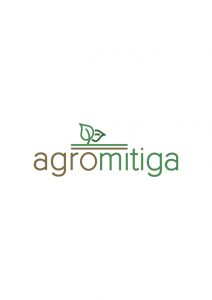 LIFE AGROMITIGA – Development of climate change mitigation strategies through carbon-smart agriculture
LIFE AGROMITIGA – Development of climate change mitigation strategies through carbon-smart agriculture
The LIFE Agromitiga project will promote a low-carbon agricultural system aimed at enhancing the mitigative capacity of soil as a carbon sink. The project will also assess the impact of different Conservation Agriculture practices; and will quantify the mitigative capacity of soil management systems in the Mediterranean Basin (Greece, Italy, Portugal and Spain), in both herbaceous and perennial crops. The project focuses on the development of a method to calculate the carbon footprint at different crop cultivation stages, in line with international standards, and a tool to quantify the increase of carbon in soils due to better soil management practices. This will significantly improve knowledge about the carbon content of agricultural soils and demonstrate that Conservation Agriculture can reduce GHG emissions in the Mediterranean Basin. Furthermore, the project will promote the implementation of soil management systems that mitigate climate change through training and awareness raising. UNIFI participated in networking meetings with the project team to design joint activities.
 LIFE SHEPFORBIO (LIFE20 NAT/IT/001076). The aim of the project is to improve the conservation status of three types of grassland habitats, recognised as being of communitarian importance by the Habitats Directive (Habitat 5130, 6210*, 6230*). The areas involved in the project are located both within the Foreste Casentinesi,
LIFE SHEPFORBIO (LIFE20 NAT/IT/001076). The aim of the project is to improve the conservation status of three types of grassland habitats, recognised as being of communitarian importance by the Habitats Directive (Habitat 5130, 6210*, 6230*). The areas involved in the project are located both within the Foreste Casentinesi,
Monte Falterona and Campigna National Park, a tract of the northern Apennines between Tuscany and Romagna, and in the Pratomagno area, a mountain dorsal between Valdarno and Casentino. The LIFE ShepForBio project plans direct interventions for the conservation of these target habitats, through their restoration and through the fight against the spread of shrub and tree vegetation, the enhancement of pastoral management, building infrastructures at the service of shepherds, supporting the local agricultural realities and promoting new activities, through the creation of a school for shepherds and breeders. The goal is to promote pastoralism in rural and mountainous areas, helping to fight the lack of generational change that afflicts this sector, and to valorise it as a way for a sustainable and long-lasting management of these environments. Good practices for the management and recovery of mountain pastures were shared.
 LIFE LIVEADAPT (LIFE17 CCA/ES/000035) The project, comprising international research of Spain, Portugal and France aims at identify adaptation to climate change in livestock production of southern Europe. In the specific LIVEADAPT will implement strategies based on technologies and innovative practices that will allow the adaptation of the livestock sector to climate change. Innovations in the improvement of the collection and the use of water or use of ICT for the management of livestock is emerging as the lines of action to follow in this regard. UNIFI has established contacts with the coordinating beneficiary so as to promote interactions between the two projects but also the possibility of presenting project proposals together.
LIFE LIVEADAPT (LIFE17 CCA/ES/000035) The project, comprising international research of Spain, Portugal and France aims at identify adaptation to climate change in livestock production of southern Europe. In the specific LIVEADAPT will implement strategies based on technologies and innovative practices that will allow the adaptation of the livestock sector to climate change. Innovations in the improvement of the collection and the use of water or use of ICT for the management of livestock is emerging as the lines of action to follow in this regard. UNIFI has established contacts with the coordinating beneficiary so as to promote interactions between the two projects but also the possibility of presenting project proposals together. The SUSALPS German project (financed by the Federal Ministry of Education and Research) aims at improving the knowledge on the effects of current and future climate and management on ecosystem functions performed by grasslands. In the process, the general framework of the socio-economy of the specific geographic region will be considered. Based on this improved knowledge, sustainable management options for grasslands in the alps and the foothills of the alps will be developed. These management options will be especially designed to support the climate protection function of grassland soils. UNIFI has established contacts with the coordinating beneficiary and a networking visit has been planned.
The SUSALPS German project (financed by the Federal Ministry of Education and Research) aims at improving the knowledge on the effects of current and future climate and management on ecosystem functions performed by grasslands. In the process, the general framework of the socio-economy of the specific geographic region will be considered. Based on this improved knowledge, sustainable management options for grasslands in the alps and the foothills of the alps will be developed. These management options will be especially designed to support the climate protection function of grassland soils. UNIFI has established contacts with the coordinating beneficiary and a networking visit has been planned. is a dissemination project aimed at transferring and unify the knowledge derived from the work of experts, farmers and managers of the agro-livestock sector on good management practices that promote the preservation and accumulation of carbon in pastures, as well as soil fertility, biodiversity conservation and mitigation of greenhouse gas emissions, encouraging more productive and sustainable pastoral systems within the framework of the regional government of Catalonia. On the 20th of November 2020 we met remotely with the coordinating partner of the PASTUCAR project (Forest Science and Technology Centre of Catalonia (CTFC), Solsona, Lleida). Since the topics analyzed by the two projects are very similar an exchange of knowledge will help in establishing some joint activities and synergies between the two projects, allowing to extend PASTORALP results and findings in different areas.
is a dissemination project aimed at transferring and unify the knowledge derived from the work of experts, farmers and managers of the agro-livestock sector on good management practices that promote the preservation and accumulation of carbon in pastures, as well as soil fertility, biodiversity conservation and mitigation of greenhouse gas emissions, encouraging more productive and sustainable pastoral systems within the framework of the regional government of Catalonia. On the 20th of November 2020 we met remotely with the coordinating partner of the PASTUCAR project (Forest Science and Technology Centre of Catalonia (CTFC), Solsona, Lleida). Since the topics analyzed by the two projects are very similar an exchange of knowledge will help in establishing some joint activities and synergies between the two projects, allowing to extend PASTORALP results and findings in different areas. Life ADA – Adaptation in Agriculture – (LIFE19 CCA / IT / 001257) aims to increase the capacity of farmers and producer organizations (in wine, fruit and vegetable and dairy sectors) to implement adaptation strategies to climate change. To achieve this goal, a public-private partnership has been set up between insurance, public administration (regions), scientific institutes and aggregated forms of producers. This group aims to transfer knowledge on climate scenarios and risk management, as well as measures for adaptation to climate change; to build adequate tools to support the decision-making process and in the definition of adaptation plans at farm and supply chain level; to define a regional policy strategy to support farmers’ adaptation plans; to promote an innovative approach in order to maintain the long-term insurability of farmers despite the increase in catastrophic and systemic risks. UNIFI has established contacts with the coordinating beneficiary.
Life ADA – Adaptation in Agriculture – (LIFE19 CCA / IT / 001257) aims to increase the capacity of farmers and producer organizations (in wine, fruit and vegetable and dairy sectors) to implement adaptation strategies to climate change. To achieve this goal, a public-private partnership has been set up between insurance, public administration (regions), scientific institutes and aggregated forms of producers. This group aims to transfer knowledge on climate scenarios and risk management, as well as measures for adaptation to climate change; to build adequate tools to support the decision-making process and in the definition of adaptation plans at farm and supply chain level; to define a regional policy strategy to support farmers’ adaptation plans; to promote an innovative approach in order to maintain the long-term insurability of farmers despite the increase in catastrophic and systemic risks. UNIFI has established contacts with the coordinating beneficiary. LIFE MIDMACC (LIFE18 CCA/ES/001099) The project promotes adaptation through the implementation and testing of different landscape management measures to meet climate change related challenges in marginal mid-mountain areas of Spain (La Rioja, Aragón and Catalonia), while improving their socioeconomic development. We implement three pilots experiences in mid-mountain areas: (i) pasture recovery through scrubland clearing and introduction of extensive livestock farming; (ii) forest management for fire risk prevention and maintenance with extensive livestock farming; and (iii) introduction and/or optimisation of vineyards in mountain areas. Main project activities include: 1) develop landscape adaptation measures in marginal mid-mountain areas in order to improve their environmental and socioeconomic resilience to climate change: 2) assess the socio-economic and ecological effectiveness of the applied measures through widespread monitoring and modelling; 3) involve the regional managers and stakeholders in the design, development and evaluation of adaptation measures, through decision-making regional committees; 4) engage the governments of La Rioja, Aragon and Catalonia in the creation of a coordinated policy framework that improves the sustainable use of mid-mountain areas; 5) develop an integrated climate change Adaptation Guidelines for mid-mountain areas; 6) carry out awareness and capacity building activities on adaptation to climate change at local and regional level; and 7) support the application and further development of European policies related to climate change adaptation in mountainous rural areas. Networking activities have been outlined and visits to the pilot experiences along 2021-2022 are been programmed.
LIFE MIDMACC (LIFE18 CCA/ES/001099) The project promotes adaptation through the implementation and testing of different landscape management measures to meet climate change related challenges in marginal mid-mountain areas of Spain (La Rioja, Aragón and Catalonia), while improving their socioeconomic development. We implement three pilots experiences in mid-mountain areas: (i) pasture recovery through scrubland clearing and introduction of extensive livestock farming; (ii) forest management for fire risk prevention and maintenance with extensive livestock farming; and (iii) introduction and/or optimisation of vineyards in mountain areas. Main project activities include: 1) develop landscape adaptation measures in marginal mid-mountain areas in order to improve their environmental and socioeconomic resilience to climate change: 2) assess the socio-economic and ecological effectiveness of the applied measures through widespread monitoring and modelling; 3) involve the regional managers and stakeholders in the design, development and evaluation of adaptation measures, through decision-making regional committees; 4) engage the governments of La Rioja, Aragon and Catalonia in the creation of a coordinated policy framework that improves the sustainable use of mid-mountain areas; 5) develop an integrated climate change Adaptation Guidelines for mid-mountain areas; 6) carry out awareness and capacity building activities on adaptation to climate change at local and regional level; and 7) support the application and further development of European policies related to climate change adaptation in mountainous rural areas. Networking activities have been outlined and visits to the pilot experiences along 2021-2022 are been programmed. LIFE AGROMITIGA – Development of climate change mitigation strategies through carbon-smart agriculture
LIFE AGROMITIGA – Development of climate change mitigation strategies through carbon-smart agriculture LIFE SHEPFORBIO (LIFE20 NAT/IT/001076). The aim of the project is to improve the conservation status of three types of grassland habitats, recognised as being of communitarian importance by the Habitats Directive (Habitat 5130, 6210*, 6230*). The areas involved in the project are located both within the Foreste Casentinesi,
LIFE SHEPFORBIO (LIFE20 NAT/IT/001076). The aim of the project is to improve the conservation status of three types of grassland habitats, recognised as being of communitarian importance by the Habitats Directive (Habitat 5130, 6210*, 6230*). The areas involved in the project are located both within the Foreste Casentinesi, RAGE4CLIMATE (LIFE15 CCM/IT/000039)
RAGE4CLIMATE (LIFE15 CCM/IT/000039) LIFE O
LIFE O LIFE ADAPTAMED (LIFE14 CCA/ES/000612)
LIFE ADAPTAMED (LIFE14 CCA/ES/000612) LIFE ADAPT2CLIMA (LIFE14 CCA/GR/00092)
LIFE ADAPT2CLIMA (LIFE14 CCA/GR/00092)  EUROMONTANA
EUROMONTANA
